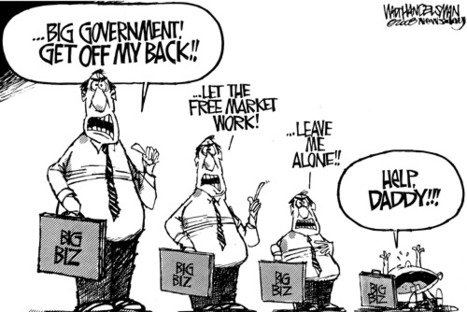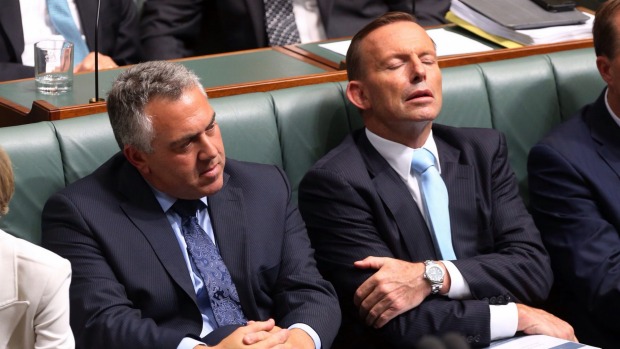When even the experts disagree, it’s not surprising that the electorate are divided on privatisation. The only say that Australians get in the sale of the assets we jointly own is at election time but I sometimes wonder if voters fully consider the ramifications of privatisation and asset recycling.
Joe Hockey and Tony Abbott are both determined to use their time on the Treasury benches selling every Commonwealth asset they can and, by making funding dependent on it, they are forcing state premiers to do the same.
Joe wants to follow the Costello fire sale approach to fixing his budget while Tony wants roads, roads, and more roads to be his legacy.
Last year the Productivity Commission released a report into the provision of public infrastructure which concluded that there is “an urgent need to improve how public infrastructure projects are selected, funded, financed and delivered.”
“There are many examples of inadequate project selection that have led to costly outcomes for users and taxpayers. …poorly chosen infrastructure projects can reduce productivity and financially burden the community for decades with infrastructure that is unnecessary and expensive to maintain… The costs of poor project selection and delivery will be exacerbated if governments decide to increase their infrastructure investment programs without reforming their governance regimes…
To sum up, governments are sometimes weak at determining what, where and when infrastructure projects should be scoped and constructed. This stems from deficiencies in using coherent decision-making frameworks to assess the portfolio of potential projects.”
The PC argues that it is critical that governments build a “credible and efficient governance and institutional framework for project selection”, since “selecting the right projects is the most important aspect of achieving good outcomes for the community”.
“Properly conducted cost–benefit studies of large projects, and their disclosure to the public” is seen as key to guide project selection and improve the transparency of decision making and they recommend public disclosure of CBAs for any project over $50 million.
The report mentions the ACT Light Rail Project as an example of poor decision making.
“The ACT Government’s decision to proceed with a light rail project appears to be an example of where the results of cost–benefit analysis have been ignored without a valid explanation…
In a submission to Infrastructure Australia in 2012, the ACT Government analysed a number of options including bus rapid transit (BRT) and light rail rapid transit (LRT). The analysis estimated that the upfront capital costs for the BRT and LRT would be $276 million and $614 million respectively (on an undiscounted basis) (ACT Government 2012).
In its economic appraisal (which is essentially a cost–benefit analysis), the ACT Government found net present values of $243.3 million for BRT and $10.8 million for LRT. The benefit–cost ratio for BRT was estimated at 1.98, with 1.02 for LRT. In the assessment, the benefits of BRT and LRT were similar ($491.8 million against $534.9 million respectively), but the cost of BRT was less than half that of LRT ($248.5 million against $524.1 million, when discounted by 7 per cent). The cost–benefit analysis took into account a range of factors including journey times, and avoided environmental impacts and accidents (ACT Government 2012)…
In summary, a cost–benefit analysis showed BRT to be a greatly superior option than LRT…”
It also warns against the view that private sector provision is necessarily best, noting instead that it brings “additional risks and costs, which need to be weighed against the benefits”, and “only if well-designed and executed does a PPP agreement offer the potential for efficiency gains compared with traditional public procurement”.
– Private financing is not a ‘magic pudding’ — ultimately users and/or taxpayers must foot the bill.
– Government guarantees and tax concessions are not costless and often involve poorly understood risks.
The “poles and wires” are a prime example of this.
Every five years, the federal energy regulator grants the distribution and transmission network companies an allowance to spend on capital and operating costs. In 2009, the networks claimed to need billions to build new infrastructure to meet soaring demand and the Australian Energy Regulator approved a staggering $45 billion of spending.
Not only that, they ruled that the NSW distribution networks could claim an astonishingly high cost of capital of 10.02% per annum, which it said was equal to the borrowing costs of a private company at that time. In fact, they borrow from a triple A–rated state treasury at rates of around 4–5%.
This meant that, for every billion dollars they borrowed to spend on infrastructure, the NSW networks were now able to charge their customers an extra $100 million every year (decreasing over time as the loan was paid off). Gerard Brody, an advocate from the Consumer Action Law Centre, said “This was just pure profit coming from consumers’ hip pockets. There’s no rational, economic reason for consumers paying that sort of money.”
According to the Australian Bureau of Statistics, the electricity industry’s profits rose by 67% between 2007–08 and 2010–11. In this same period, electricity bills rose 40%. With tacit approval from the federal government, they carried on spending billions of dollars on new infrastructure we didn’t need, based on projections that were obviously wrong. According to the federal treasury, 51% of your electricity bill goes towards “network charges”.
The PC report also warns that Abbott’s bribes to the states, otherwise known as asset or capital recycling,
“could act to encourage privatisation in circumstances that are not fully justified and encourage the selection of new projects that do not have demonstrable net benefits. Already, examples of promises to reinvest have emerged in regions where assets are being sold. Tying funds to particular regions is no assurance that the highest net benefit investments are being considered.”
On Tuesday, the head of the NSW state government’s infrastructure advisory criticised the Abbott government’s refusal to fund public transport projects.
“I can’t really understand the logic of saying we will only invest in a transport project if it involves bitumen as opposed to one that involves steel rails,” said Jim Betts, the chief executive of Infrastructure NSW.
“It seems to be arbitrary,” he said of Mr Abbott’s stance. “I can’t understand how public transport is somehow beyond the pale. It’s a shame because particularly I would like to see bodies like Infrastructure Australia able to give modally agnostic advice.”
As a short term budget fix, Hockey is also considering selling six government-owned buildings in Canberra, including one that houses the Treasury Department.
The scoping study will look at options for the John Gorton and Treasury buildings, as well as East and West block and Anzac Park East and West, which are in Canberra’s Parliamentary Triangle.
As Peter Martin points out
“Once sold, they would be leased back to the departments of Treasury and Finance and whoever needed to use them. For the next four years (as far out as the budget’s detailed forecasts go), Hockey’s accounts would look good. He would have raised serious money. Beyond that, his successors would be paying out serious rent.
The Howard government sold the purpose-built Foreign Affairs headquarters to the to the Motor Traders’ Association super fund for $217 million in 1998. By 2017 it will have paid out $311 million in rent. Foreign Affairs can’t move out, and what dressed up the budget nicely in 1998 will cost $20 million or more per year in rent forevermore.”
Medibank Private has already been sold, raising $5.679 billion which will be invested in roads.
In the four years after the Rudd government converted Medibank Private into a profit-making insurer, the Commonwealth collected $1.366 billion in dividends and taxes. This amounts to a 16-fold return on the $85 million it put into Medibank.
The federal government is studying whether to sell the Royal Australian Mint, hearing-aid provider Australian Hearing, Defence Housing Australia and the Australian Securities & Investment Commission’s corporate register, according to its budget papers.
The national commission of audit also recommended selling assets including Australia Post, power generator Snowy Hydro Ltd. and Australia Rail Track Corp., the main interstate rail network.
Not to be left out, Christopher Pyne has refused to rule out selling the HECS debt.
The Commonwealth would sell the rights to its $30 billion stream of long-term debt repayments at a reduced price of, say, $15-$20 billion today. While the Government would receive some funds up-front, it would lose the ongoing cash flow as loans are repaid – in effect substituting a future income stream for a much smaller lump-sum.
To make Hockey’s budget look better temporarily, and to pay for Tony’s road fetish, we are selling off assets that would provide a future revenue stream. What will our children do with less revenue, no assets to sell, and increased costs to pay the private sector for what used to be ours?










